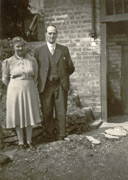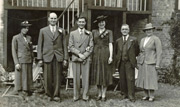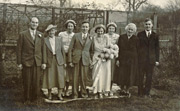 |
| Mum and Dad at the rear of their house at 12 Roland Avenue, c1939. |
In the mid 1930s, Mum and Dad were not finding life as easy because soon after moving to Wilford Dad had made a bad investment in a scheme which failed. I think he was the victim of a con man. The income from the fish shop was not covering its costs and so was closed. Dad got a job with Star Stores, a Nottingham firm where they sold goods on credit. Dad had to make deliveries on his bicycle and this was not easy when he had items that were bulky, like bedding, or fragile like tea services. The long distances he walked and cycled in all weathers were too much for him.
On doctor's advice Dad had to find lighter work. He was lucky that Mr Lill, a neighbour, told him that there was a vacancy at the Nottingham Co-0perative Society for a collector of cash which was being paid every week for goods that had been supplied on credit. His application was accepted and now his journeys were shorter and many of his calls were door-to-door. He would enter the payments into a big ledger and I was able to assist him by counting the money to balance the accounts, which earned me some pocket money.
Mum worked hard housekeeping and cooking but she was far from fit. She probably had a heart condition and certainly had bronchitis during the winter months. Coughs and colds seemed to have been worse for everyone in those days.
 |
 |
| Eva and Leonard's wedding in May 1939. |
Edna and Jack's wedding at Christmas 1939. |
In 1939 we celebrated two weddings in our family. On Whit Saturday 27th of May my sister Eva was married at St. Wilfreds Church in Wilford to Leonard Stones. Eva and Leonard were both librarians at branches of the Nottingham Public Library. On her wedding day Eva wore a green dress. My elder sister Edna was the bridesmaid and she had a pink dress. Eva and Edna had brown hats, gloves and shoes. Leonard's best man was Lesley who was a long time friend from schooldays.
The second wedding was on Christmas Day 25th December 1939 and also at St. Wilfreds Church. Edna married John Lewis who was always known as Jack. They were both members of Nottingham Chapels. Jack's brother-in-law was the best man and there were two bridesmaids, me and Jack's youngest sister who was married to the best man. Edna wore a flowered dress, silver shoes, a short veil held by a silver head-dress and carried golden chrysanthemums. We bridesmaids had lavender dresses and carried matching muffs with a silver spray of leaves, a silver spray headband and silver shoes. My strongest memory of that day was the extreme cold and my dress was no match for the icy wind!
When I ended my schooldays I wanted to go into office work and so Dad took me to the offices of Nottingham Co-operative Society to see if they had a vacancy in any of their departments. I needed to pass tests of my skills in writing, maths and to show that I could handle cash. I passed, but I was told there would be no vacancies until the end of December.
In the last years of the 1930s people talked of war and in 1939 men were being conscripted. We had all been given a gas mask in a cardboard box which most people covered with a waterproof fabric. We learned about air-raid precautions and air-raid shelters were being built.
On the 3rd September 1939 Britain declared war on Germany. Dad became an air-raid warden and although I was not officially a member I was issued with a steel helmet. Sometimes the air-raid siren would go, but no bombs would fall so everyone called this the 'Phoney War'.
Since I was no longer at school and with no work yet, I went with Mum on the 5th September to the National Laundry near the toll bridge on Wilford Road. We had gone there to get some of Dad's stiff collars cleaned and starched. While Mum was dealing with that I asked the young lady in the shop if there were any vacancies for an office junior and she directed me to a door with a window. When I rang the bell the window slid down and to my surprise it had been opened by Mavis Sheffield who had been at Wilford School with me. Mavis introduced me to Mrs Cartwright, the head clerk who lived in Wilford, and she told me I could start the next day.
So on the 6th September 1939, at the age of fourteen, I began my working life. I started to learn all about the cleaning services the laundry gave. My first job was to collect the time cards from the clocking-in machine and take them to the office where I checked them. I also did all the routine tasks like ensuring that all the women who did the marking on the clothes had enough ink, but not too much to avoid spills! The boss was Mr Henry Redgate who lived in Wilford. His two middle aged sons helped him run the company. They took care of the health of the staff to the extent of giving hot milk and biscuits to everyone each morning. This might have been to counter the possible ill effect of the cleaning chemicals and of the damp atmosphere.
On the 29th September all householders had to fill in a form to give particulars of everyone in their house and the next day we all had to collect our Identity Cards at the Parish Hall. My identity number was RNST411/4.
In December the application I had made at the Co-op brought an offer of a position in the offices of the Nottingham Co-operative Wholesale Society Bakery. I had been happy working at the laundry but this new job would give me more varied work and progress would be faster.
I had seen many changes in the 1930s but it now looked as if those would be small compared with the 1940s.
 Home
Home